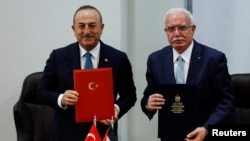Turkish Foreign Minister Mevlut Cavusoglu Wednesday becomes the first senior Turkish official to visit Israel in 15 years. After a stop in the Palestinian territories, the foreign minister goes to Israel hoping to consolidate rapprochement efforts between the countries, which withdrew their ambassadors in 2018.
Foreign Minister Mevlut Cavusoglu’s visit is the latest sign of a thaw in relations after Israeli President Isaac Herzog visited Turkey in March. Reports say cooperation in exploiting Israel's vast gas reserves will be part of Cavusoglu's agenda.
Mithat Rende, a former Turkish ambassador to Qatar, is now an energy industry consultant. He outlines what he believes is at stake.
“They will have to set a positive agenda in the interests of the two sides. To start with energy cooperation, with economic cooperation, trade, tourism, health, agriculture, even climate change because this is a very vulnerable region, [the] east Mediterranean. So, both countries will improve their relations. There is a will on both sides,” he said.
Relations between the once-close allies collapsed over Israel's policies toward the Palestinians, culminating in both countries’ withdrawing ambassadors in 2018. Ahead of visiting Israel, Cavusoglu held talks with Palestinian officials Tuesday.
Turkish President Recep Tayyip Erdogan has strongly supported the Palestinian cause, engaging in fiery rhetoric against Israel. But Erdogan's reaching out to Israel to repair relations is part of a broader policy by Ankara to overcome its regional isolation, says Sinan Ulgen of the Center for Economics and Foreign Policy Studies, a research organization in Istanbul.
“It's part of a wider strategy that we are seeing since the beginning of 2020, 2021, where Turkey essentially decided to recalibrate its foreign policy after an acknowledgement that past aggressive foreign policy led Turkey down a path of regional isolation,” he said.
Cavusoglu is also expected to discuss with his Israeli counterpart, Yair Lapid, the return of ambassadors. Improving bilateral ties will allow Israeli leaders to focus more on Iran, which they considered Israel’s primary threat. Erdogan has also criticized Tehran's growing regional influence.
Gallia Lindenstrauss, an analyst at the Institute for National Security Studies, a research organization in Tel Aviv, says Israel will remain cautious over Turkish overtures.
“The reasons why these two countries drifted apart are still here: The problems with the Israeli-Palestinian arena. The problem is that these countries have less shared interests than in the past. The problem is Turkey is a more revisionist actor, and Israel is more a status quo actor in the Middle East. I think all these elements are still here. But if these two countries can manage to return their ambassadors, we should congratulate them, and hopefully, this [brings] some stability in a very unstable region,” she said.
Some analysts say Ankara's rapprochement efforts with Israel are motivated by the goal of breaking up Israel's deepening ties with Turkish rivals Greece and Cyprus and that Israel will move cautiously in its dealings with Turkey. They say Israel will be aware that Erdogan's days in power may be numbered, given he is facing reelection next year and is lagging in the polls.








